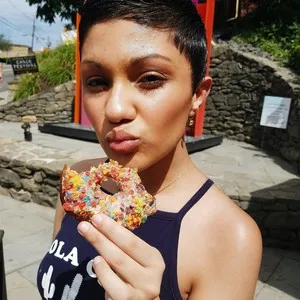At the end of the “Girls” sixth and final season premiere, we’re left with a sense of emotional chaos. Hannah can’t seem to enjoy anything wholeheartedly, while Shoshanna and Marnie are backsliding into old patterns (and boyfriends). As for Jessa? She’s still, well, Jessa. Yet, despite this overwhelming mess, I can’t help but feel like my girls have grown. And so have I.
If there’s anything the past seasons of “Girls” have taught me (besides to never text your boyfriend using only emojis), it’s that character growth happens on a spectrum. Character development is not a graph of logistic growth, growing exponentially until you taper off at a fully functional adult. You have peaks and valleys as you mature indefinitely, and that’s perfectly normal.
Girls, myself included, have a tendency to think that we’re overreacting, that our emotions are about an 8.0 on the Richter scale. We feel as though we must act a certain way and mature at a certain pace to fall into the confines of normalcy. So it was more than refreshing to see that the characters in “Girls” grow at their own cadence, one much more similar to my own.
Hannah, for example, defines the word turbulent. At the end of season 2, we see a more self actualized version of her. She’s writing an e-book. She’s not dating a guy with weird fetishes anymore. She’s valuing herself with her own currency, not the one doled out by society. Then, in an earth-shattering plot twist that makes you rethink everything, she breaks down. After a failed draft and a new onset of OCD, Hannah breaks her moral compass.
In the following seasons, Hannah rebuilds herself at a human pace. She gets into graduate school. She drops out of graduate school. She writes manically. She doesn’t write at all. She spends entirely too much time with her friends. She talks to none of her friends. Then, in the last premiere, something clicks. As Hannah tastes real adulthood for the first time, she begins to “accept that maybe certain aspects of her personality are baked in.”
As I continue to meander into my senior year of high school and whatever happens after, I feel relaxed. I have “Girls” to thank for that. My friends are panicking about the inherent finality in every decision from when to take the SAT or to if they should wear a choker, but I am living. Hannah’s phoenix-esque rise has shown me that everything will kind of work out in the end. None of my existential crises, stress-induced breakdown, or impulsive decisions will be my undoing. Each of them have a clear purpose: to make me better.
Of course, Hannah doesn’t get here without her friends. Without Marnie’s enduring support, Shoshanna’s sharp decision making, and Jessa’s train-wreck lifestyle to make her feel better about herself, she would never have the courage to leave her bedroom. The people you surround yourself with need to do the same. Much like decisions, each person has an intrinsic benefit. Someone needs to be your hype-girl. Someone needs to be your conscious, and someone needs to be your scale.
As I build bridges to new friendship and burn old ones, this model follows me. I know it’s hard to realize now, in high school, where worth correlates with Instagram likes, but everyone has value. Even you. In keeping with this, I try to be befriend those who will elevate my value past that of social media, who make feel comfortable.
Yes, the “Girls” squad is nowhere near complete #squad goals. They steal each other’s boyfriends and spotlights, leading them to fight more frequently than they have sex. But that’s the thing. They argue frequently because they feel comfortable with one another to a point of unsolicited frankness. I want that level of honesty for myself and you, too.
The Bottom Line:
There’s few television shows that transcend generations. Never did I think I could relate to a dramedy (drama + comedy) soaked in the privilege of being twenty-something, white, and in the art world. But I more than related. I saw bits of my future self in each of our protagonists, feeling the kind of forward nostalgia you only hear about in coming-of-age novels. “Girls” has normalized my girlhood, womanhood, and in-between-hood. For that I am forever grateful.


